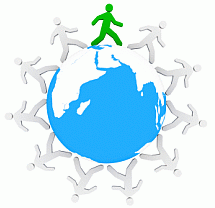Most people choose to volunteer abroad with an awareness that they will not only be working for free, but that they will have some sort of cost associated with them – be it administrative fees, room and board, airline tickets or all of thee above. But you may have heard of some volunteer programs that actually pay their volunteers either with stipends, travel expenses or other incentives. While there are not many of these out there, they do exist. These are not simply free or low cost volunteer opportunities, but programs that provide enhanced financial security to their volunteers abroad.
The major volunteer abroad programs that provide compensation of some kind are also those that require a high-level or specialized skills set. These programs are usually competitive and may have time constraints.
UN Volunteers is a high profile volunteer experience for people who are over the age of 25, have a bachelor’s degree and have at least two years of work experience. Volunteers should have a previous volunteer abroad experience, and knowledge of English, Spanish and/or French is highly preferred. UN Volunteers are placed in developing countries, but unlike most placement organizations, the positions are demand-driven. This means that you will only be chosen if there is a vacancy available for which you are qualified. Your resume and application will be entered into the database until a match is found. This can make planning difficult, as you may have to wait several months to received a placement. However, the system ensures that the needs of the community are truly being met, and that your skill set can be put to the best possible use. UN Volunteers have all of their expenses covered – airfare, insurance, room and board – and receive a modest stipend for their work. Most volunteers are expected to commit for at least one year, and most projects are at least 6 months long.
UN Volunteers have all of their expenses covered – airfare, insurance, room and board – and receive a modest stipend for their work. Most volunteers are expected to commit for at least one year, and most projects are at least 6 months long.
International Executive Service Corps is similar to UN Volunteers in that is maintains a database of potential volunteers, and send them for specific-term projects in developing countries. Projects cover a large breath of industries, and are focused primarily on the providing assistance that can boost communities’ economies and small businesses. For example, IESC helped a local hotel in Sri Lanka with long-term strategic planning. They also work with US AID on community development projects around sustainable farming and agricultural practices. While not as established as UN Volunteers, IESC does offer shorter-term placements that might work for people who can take some time off of work to volunteer abroad.
Finally, the Peace Corps is technically a paid volunteer job. As you can read in our Peace Corps Volunteer spotlight piece, the opportunities are fully-sponsored and include airfare, health insurance and room and board in addition to a stipend. The Peace Corps also offers funding upon return to the US to assist with resettling in the United States. However, the Peace Corps is a very different placement process than other paid volunteer programs. Most of the volunteers who sign up for the Peace Corps have limited job experience, and are placed into ongoing projects rather than the short-term targeted projects of UN Volunteers or IESC. While volunteers can state preferences in their application, it is fully up to the discretion of the Peace Corps to place volunteers. Peace Corps volunteers can end up just about anywhere, and do anything.
As you can see, there are limits to “paid volunteer service”, but opportunities are out there. It is important to remember that the position with the organizations mentioned here will be competitive, and will require specialized skills. If you are a recent graduate who is looking for an opportunity that is less intensive, but don’t want to pay high administrative fees, please check out some of the free and low cost volunteer programs at the JobMonkey blog.